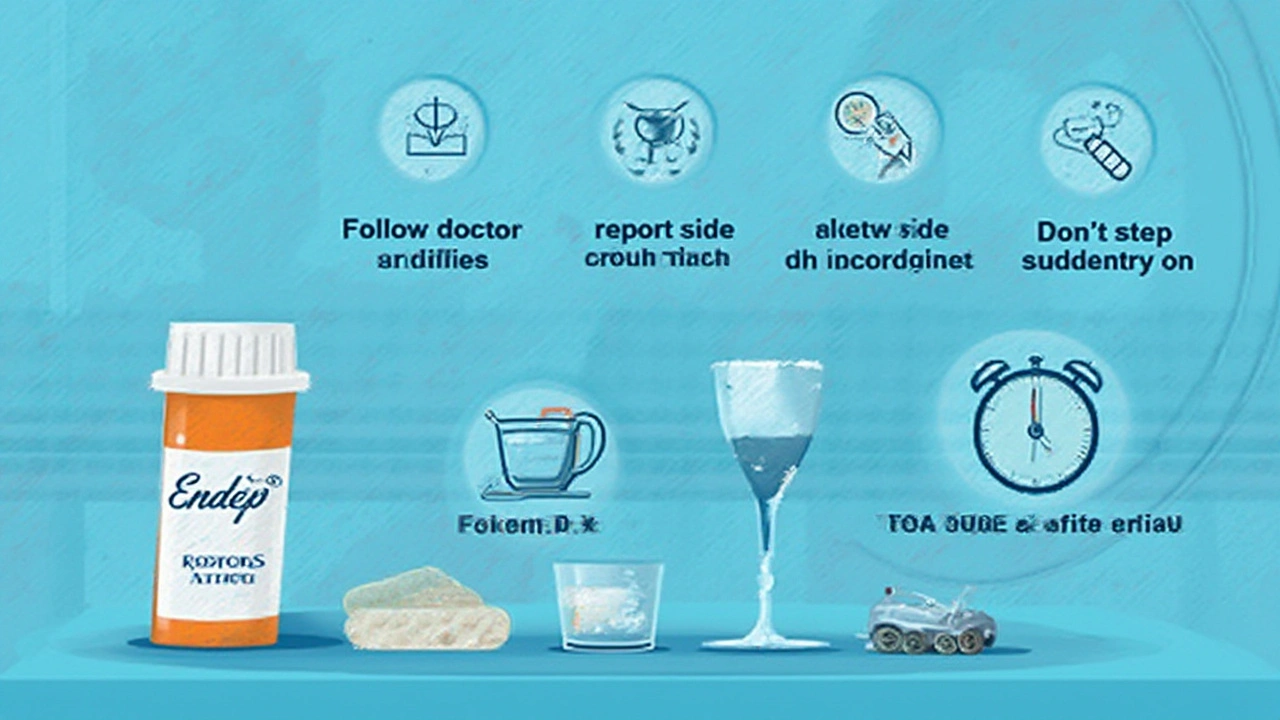Endep Uses, Side Effects, and Tips: Everything You Need to Know
 Jul, 12 2025
Jul, 12 2025
Some pills have stories as tangled as the troubles they treat, and Endep is no exception. You’ll find it in medicine cabinets from busy city clinics to quiet country homes, prescribed for everything from aching nerves to dark moods. Yet most people don’t realize Endep—the familiar brand name for amitriptyline—started out fighting depression but now fights pain, migraines, and sleepless nights too. Why do doctors keep reaching for this old-school pill when newer drugs flood the shelves? The answer is a mix of science, real-life results, and a dash of medical mystery. Before you swallow your first pill or worry about the side effects you read about online, get the full story here.
What Is Endep and What Is It Used For?
Endep is the brand name for amitriptyline, a drug first developed back in the early 1960s. Its original label declared it an antidepressant—specifically, a tricyclic antidepressant (TCA). But while many modern antidepressants have come and gone, Endep has stubbornly hung on, branching out far beyond its first job. These days, doctors prescribe Endep not just to lift low moods, but to tackle neuropathic pain (like tingling or stabbing sensations after shingles or diabetes), tension headaches, migraine prevention, irritable bowel syndrome, some anxiety types, and even stubborn insomnia. This versatility comes from the way Endep works in your brain and body: it increases levels of certain neurotransmitters, mainly serotonin and norepinephrine, which can regulate mood, pain signals, and sleep.
Endep is taken in pill form, with doses starting low and gradually increased. Typical daily doses for depression might begin at 25 mg and slowly rise up to 150 mg per day, while pain or migraine prevention often involves much lower doses—sometimes as low as 10 mg before bed. It's not a "one size fits all" medication; your doctor will adjust based on how your body responds. In the UK and Australia, Endep is still a mainstay for neuropathic pain, often beating out newer options for cost and effectiveness. Fun fact: Amitriptyline keeps its place on the World Health Organization's List of Essential Medicines, a big sign it punches above its weight.
How Does Endep Work?
Endep doesn’t just target one system in your body; it’s more like a Swiss army knife, flipping out different chemical blades depending on what’s needed. The main action involves blocking the reabsorption (reuptake) of serotonin and norepinephrine, two neurotransmitters crucial for stable mood and pain regulation. This means there’s more of these chemicals hanging around in the brain, which helps nerve cells send stronger, steadier signals. That’s why Endep can both improve mood and dull chronic pain. But Endep is messy in a useful way: it also affects other systems, like those controlling sleep and gut movement, explaining why people often feel sleepy after taking it, or why it can sometimes help with irritable bowel syndrome.
One of the interesting things about Endep is that the best dose for pain or migraines is way lower than for depression. This means even if you don't have depression, your doctor might still suggest 10-25 mg at night to help with nerve pain or headaches. Sleepiness, which might annoy you if you’re taking it for depression, can be a plus if you’re struggling to nod off with chronic pain or restless sleep. Don’t expect instant magic—Endep can take one to two weeks for pain relief and several weeks for full antidepressant effects. There's old school research showing Endep helping up to 70% of patients with chronic neuropathic pain, outperforming some newer drugs in head-to-head trials.

Endep Side Effects: What to Expect
Knowing the potential side effects helps you feel more in control if Endep is in your medicine cabinet. Like many older drugs, Endep is famous for both its benefits and its quirks. The most common side effect (you'll hear this one from almost everyone who takes it) is drowsiness. For some, this is a blessing if they’re fighting insomnia. For others, it feels like walking through fog the next morning. Dry mouth comes in second place—you might find yourself carrying more water, chewing gum, or complaining about a cottony mouth. Constipation shows up for a lot of folks, especially older adults or anyone on several meds. Endep can also cause a slight weight gain over time for some people, though this varies a lot.
But wait, it’s not all minor annoyances. Some side effects need more serious attention. Dizziness when standing up quickly (orthostatic hypotension) is a risk, so don’t bolt out of bed. Blurred vision, difficulty urinating, or heart beat changes (like palpitations) mean it’s time to talk to your doctor. There are some rare, but real, risks—especially in people with existing heart issues. It’s also worth knowing that Endep can interact with quite a few other meds, so always double check with your pharmacist or doctor before mixing it with anything new, even over-the-counter stuff or herbal remedies. If you're pregnant, planning a pregnancy, or breastfeeding, bring it up before starting Endep.
Check out the table below to see just how common some of the better-known side effects are, based on published reviews and real user reports:
| Side Effect | Reported Frequency (%) |
|---|---|
| Drowsiness | 30-60% |
| Dry Mouth | 20-50% |
| Constipation | 10-20% |
| Weight Gain | 10-15% |
| Dizziness | 10-20% |
| Blurred Vision | 5-10% |
Dosage and Safe Use Tips for Endep
Doctors go low and slow with Endep, for good reason. The old adage is true—start at the lowest dose that might work, then creep up as needed. If you’re taking Endep for pain relief (not depression), expect a starting point of about 10 to 25 mg at bedtime. For depression, doctors might start at 25 mg, then go up slowly, sometimes reaching 150 mg per day. Taking Endep at night helps dodge the worst of the drowsiness. Missing a dose here and there isn’t usually dangerous, but skipping regularly means you probably won’t get the benefit or could feel withdrawal.
- Always swallow Endep tablets with a full glass of water—this helps with absorption and eases some digestive discomfort.
- Try to drop into a routine, same time every evening, so your body expects it and adjusts better.
- Don’t suddenly stop Endep, even if you feel better. Suddenly quitting can bring headaches, nausea, sleeping trouble, and odd feelings. Chat with your doctor about a slow taper when you’re ready to stop.
- Keep an eye on alcohol—mixing booze and Endep can worsen drowsiness, dizziness, and even make you more prone to stumble or fall.
- Let your dentist and all healthcare providers know you’re on Endep—this is crucial if you need surgery or a new prescription.
Ever wonder why some folks swear by Endep while others just can’t stick with it? Genetics might play a role. Your body breaks down amitriptyline with an enzyme called CYP2D6, which works faster in some people than others. Fast metabolizers might need a slightly higher dose, while slow metabolizers can get strong side effects at even low doses. If you’ve had weird reactions to meds in the past, it’s something your doctor can check.

Frequently Asked Questions and Useful Insights About Endep
So what if you still have questions? You’re definitely not alone. Here are a few of the most common things patients want to know, with real, useful answers.
- How long will it take to feel better on Endep? For nerve pain or migraines, some people notice relief within 1-2 weeks, but most need at least 3-4 weeks. For depression or anxiety, give it 4-6 weeks for the full effect.
- Is it safe to take Endep long-term? Many people use low-dose Endep for years under doctor supervision, especially for chronic pain. The side effect profile stays pretty stable over time. Regular check-ins help catch any issues early.
- Can I use Endep with other painkillers? Often yes, but talk to your doctor first. Some combos (like tramadol or SSRIs) can risk a rare condition called serotonin syndrome, so don’t mix anything new without a green light.
- What if I miss a dose? Take it when you remember, unless it’s within a few hours of the next dose—in that case, skip the missed pill. Doubling up can invite side effects.
- Does Endep work for everyone? Unfortunately, no. Some people get great results and others don’t, which is common with brain medications. If it’s not working in 6-8 weeks, your doctor might suggest alternatives or combinations.
- Is it addictive? Not in the classic sense—Endep doesn’t cause cravings or drug-seeking behavior. But your body can depend on it, especially at higher doses, which is why slow tapering matters.
Tons of people use Endep safely every day, but it pays to have clear information. One final tip? Keep a symptoms journal when starting Endep. Jot down side effects, mood changes, pain scales, or sleep patterns—it helps your doctor fine-tune your dose and avoid unnecessary discomfort. If you experience anything truly weird (hallucinations, severe chest pain, seizures), call for medical help right away.
Endep isn’t a miracle, but for some, it comes pretty close to the relief they’ve chased for years. It’s not the newest tool in the shed, but sometimes, experience wins out over flash. Always work closely with your health team. Trust your body, track the changes, and don’t settle if something feels off. Medicine is as much about you as it is about the pill in the bottle.
Paul Baker
July 14, 2025 AT 03:24Jeremy Mattocks
July 15, 2025 AT 14:55Jill Ann Hays
July 16, 2025 AT 14:04Sarah McCabe
July 18, 2025 AT 06:10Kristy Sanchez
July 19, 2025 AT 12:37Mike Rothschild
July 19, 2025 AT 20:43King Splinter
July 20, 2025 AT 05:59Dominic Fuchs
July 22, 2025 AT 05:13Ron Prince
July 22, 2025 AT 14:00Michael Friend
July 22, 2025 AT 14:46Asbury (Ash) Taylor
July 24, 2025 AT 08:49Jim Daly
July 26, 2025 AT 00:16Kenneth Lewis
July 27, 2025 AT 07:59Jerrod Davis
July 29, 2025 AT 00:59Zack Harmon
July 30, 2025 AT 23:22